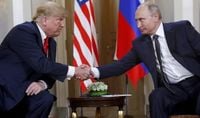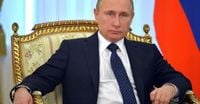In a bold move, President Donald Trump announced that he has set a deadline for Russian President Vladimir Putin to end hostilities in Ukraine. During a recent meeting with El Salvador's President Nayib Bukele, Trump stated, "I have set a deadline for Putin to end the fire," although he refrained from specifying an exact date, citing "diplomatic sensitivity" as the reason for his discretion.
Trump's comments come amidst escalating tensions in Eastern Europe, where the conflict has persisted since 2014. He emphasized that he expects "very good proposals" for resolving the ongoing conflict between Ukraine and Russia, indicating a willingness to explore diplomatic solutions.
Media outlets such as Bloomberg and The Economist have reported that the United States is considering announcing a truce by April 20, 2025, coinciding with the celebrations of Orthodox and Catholic Easter. Alternatively, a deal could be finalized by April 30, marking 100 days since Trump assumed the presidency. This timeline underscores the urgency with which the administration is approaching the conflict.
Reflecting on the origins of the conflict, Trump attributed the escalation to former President Joe Biden and Ukrainian President Volodymyr Zelensky, suggesting that their actions have contributed to the current situation. His remarks indicate a clear stance on the matter, as he continues to position himself as a potential peacemaker.
In addition to the deadline for Putin, Trump mentioned his own "psychological deadline," hinting at a personal sense of urgency regarding the resolution of the conflict. He has previously claimed that he could end the war in Ukraine "in a matter of days," reinforcing his belief in the effectiveness of his diplomatic approach.
Historically, Trump has maintained that he had a good relationship with Putin, stating that he had previously warned the Russian leader of "retaliation" should conflict arise with Ukraine. This relationship has been a focal point of Trump's foreign policy narrative, as he seeks to leverage it to facilitate peace talks.
On February 12, 2025, Putin engaged in his first telephone conversation with Trump in several years, during which the Russian president invited Trump to Moscow. This invitation marks a significant thaw in relations, suggesting that both leaders are open to dialogue. Following this conversation, Russian and American delegations met in Saudi Arabia on February 18, where they agreed to begin preparations for a potential meeting between Trump and Putin.
As the situation evolves, Trump has not shied away from calling on Russia to take action regarding the resolution of hostilities. Ahead of a scheduled meeting between Uytkoff, Trump’s special envoy for the Middle East, and Putin on April 11, Trump reiterated his expectations for progress in the peace talks.
Despite the challenges ahead, Trump's administration appears determined to pursue a diplomatic solution to the conflict, emphasizing dialogue over military engagement. The upcoming weeks will be crucial in determining whether Trump's deadline will lead to tangible results in the form of a ceasefire.
As the world watches, the implications of Trump's deadline could reverberate far beyond the borders of Ukraine and Russia. Analysts suggest that a successful resolution could reshape geopolitical alliances and alter the balance of power in Eastern Europe.
In conclusion, Trump's announcement of a deadline for Putin signals a significant shift in U.S. foreign policy regarding the Ukraine conflict. With potential milestones on the horizon, the international community remains hopeful for a resolution that could finally bring an end to the violence.







